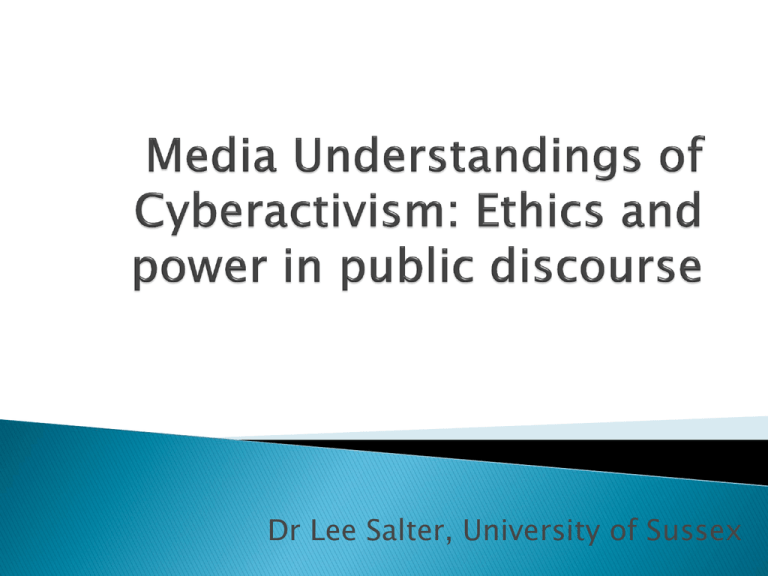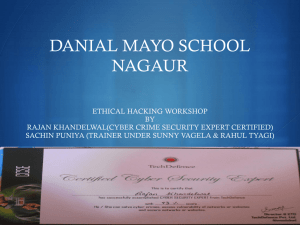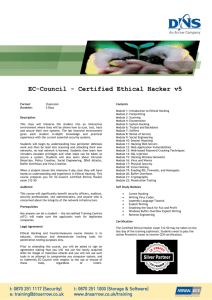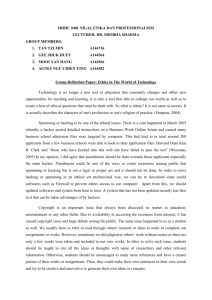Dr Lee Salter, University of Sussex
advertisement

Dr Lee Salter, University of Sussex What do we mean when we speak of ethics? What sort of hacking do we mean? How does that question impact upon the conceptualisation of ethics? Hacktivism isn’t necessarily ethical. How does that question impact on the conceptualisation of ethics? “Ethical hacking” – hacking with permission. The notion of a certified ethical hacker, certified by the International Council of E-Commerce Consultants – such hackers are given permission and report back to the company. Do no harm; protect privacy; waste not want not (computing as communal resources) Exceed limitations (break conventional morality, break unjust laws, be a disloyal employee…to fight oppression); Fight threats to freedom of communication Fight the power: “It's a moral imperative to use hacking as the equivalent of 'jujitsu,' allowing the individual to overcome larger, more impersonal, more powerful forces that can control their lives. If governments and corporations know they can be hacked, then they will not overstep their power to afflict the citizenry.” (Steven Mizrach ‘Is there a Hacker Ethic for the 90s Hackers?’) But these ethical principles are of a political nature. ◦ For example, the principle of “waste not want not” supposes an “unrealistic” notion of ownership of computing resources… but one of the questions is the to which ethics consist in “is” or “ought” Moreover, is there a single set of ethics to cover all hacktivists? Dependent on circumstance = substantive ethics Dan Schiller, How to Think About Information Giorgio Agamben, State of Exception Sarah Braman, Change of State Digital society/analogue politics – the state as the manager of potentiality ◦ Information economy in context of declining rate of profit ◦ The state of exception has today reached its maximum worldwide deployment. The normative aspect of law can thus be obliterated and contradicted with impunity by a governmental violence that – while ignoring international law externally and producing a permanent state of exception internally – nevertheless still claims to be applying the law ◦ exclusionary corporate control over information as private property is predicated on interweaving police powers throughout the tissue of social life The Washington Post celebrated Wikileaks because it ‘targets regimes in Asia, subSaharan Africa and the Middle East…It's significant that their emphasis seems to be on relatively closed societies rather than the U.S. or Europe, that have a rather robust media sector‘(10/01/07) The Sidney Morning Herald : ‘“Your country's support for the underdog and for a fair go is showing through,” a spokeswoman said’ (20/01/07) Private security agencies Palantir, HBGary and Berico tech sought to Feed the fuel between the feuding groups. Disinformaton. Create messages around actions to sabotage or discredit the opposing organizaton. Submit fake documents and then call out the error. Create concern over the security of the infrastructure. Create exposure stories. If the process is believed to not be secure they are done. Cyber attacks against the infrastructure to get data on document submitters. This would kill the project. Since the servers are now in Sweden and France putting a team together to get access is more straightforward. Media campaign to push the radical and reckless nature of wikileaks actvites. Sustained pressure. Does nothing for the fanatics, but creates concern and doubt amongst moderates. Search for leaks. Use social media to profile and identify risky behavior of employees. U.S. Army Counterintelligence: ◦ WikiLeaks 'use(s) trust as a center of gravity by protecting the anonymity and identity of the insiders, leakers, or whistleblowers. The identification, exposure, termination of employment, criminal prosecution, legal action against current or former insiders, leakers, or whistleblowers could potentially damage or destroy this center of gravity and deter others considering similar actions from using the Wikileaks.org Web site'. 'the Guardian's in murky waters where those love their country should not go‘ The Daily Mail August 21 'The Guardian has produced a "handbook" that will help fanatics strike at will', Daily Mail, October 8 "'Guardian has handed a gift to terrorists', warns MI5 chief: Left-wing paper's leaks caused 'greatest damage to western security in history' say Whitehall insider“ Guardian had presented "a gift" "UK-based extremists", a "'guide book' for terrorists“ Daily Mail, October 8 The idea that we either can or would want to operate intensive scrutiny of thousands is fanciful. This is not East Germany, or North Korea. Knowing of an individual does not equate to knowing everything about them (Head of MI5 in Daily Mail) 'catastrophic loss to British intelligence ever… He said it was “pretty much inconceivable” that Russian and Chinese intelligence agencies had not hacked into Mr Snowden’s computers and copied the material he had taken from the US‘ Telegraph (11/11/13) 'Clegg: Guardian Snowden leaks 'gifted' terrorists ability to attack', amplifying his claim on LBC Radio, that the leaks 'would have been immensely interesting for people who want to do us harm‘ Telegraph (10/11/13) – recall G.W. Bush’s speech in Atlanta No 8 2001. 'Paedophiles may escape detection because highlyclassified material about Britain’s surveillance capabilities have been published by the Guardian newspaper, the government has claimed' (Telegraph 6th Nov) Prestigious, flagship news magazine Hosted by Kirsty Walk, interviewing Glenn Greenwald 12 minute interview, took place on night of October 4 2013 following months of intense news coverage Context BBC Backgrounder on spying: “A History of government spying”: Rome, France, East Germany and the USA, No mention of British spying past 1844, no mention of any domestic surveillance in the UK or USA. ◦ ‘Behind the Cold War's Iron Curtain, surveillance of the population was an everyday part of life. Nowhere was this more prevalent than in East Germany, where for nearly 40 years the Stasi intelligence service monitored and reported on the activities of its citizens, using the information to stifle unrest’. Noteworthy that the BBC refers to the scandal as the "Spy Scandal" and the NSA leaks, focusing almost exclusively on the NSA and USA. KW: is it right for a journalist to decide what is in the public interest in respect of "national security“? (mirrored in the Daily Mail piece about 'those who love their country'). KW: "for a majority of the population, perhaps, it actually might be quite reassuring. They might actually feel quite safe?' [00:03:39.26]. KW 'But people want to know. I'll tell you why people want to know. They want to know, I suppose, that how can you guarantee that the material you have you can keep safe?' [00:05:04.08]. GG: 'The only thing we've informed people of is that the spying system is aimed at them', trying to associate with citizens’. KW ‘So it is very possible that you, actually, by your actions, make it easier for terrorists to understand how to evade all the checks that are made on them online’ [00:01:47.00]. KW ‘how can you be sure that your actions have not made it easier for terrorists to operate’ [00:02:55.17] GG: ‘The idea that terrorists didn't know, excuse me, that the United States and UK governments were trying to monitor their communications is laughable. Of course every terrorist who's capable of tying their own shoes has long known that the U.S. and U.K. governments are trying to monitor their communication’ [00:02:16.13]. Greenwald notes the ridiculousness of the task of proving no leaks and then offers that spying on Brazilian oil companies does not fit with Wark's assertions [00:03:54.23]. ‘and how do you know, more importantly, whether [Snowden] hasn't had to give up secrets if he's under Russian protection?' [00:10:56.00] Snowden ‘has been through China, obviously in Hong Kong, and he's in Russia now. You can't be sure that he hasn't had to give up something’ [00:11:33.27]. GG ‘unlike the U.K. government and the U.S. government, Mr Snowden's statements have proven to be completely true in every single instance’ [00:11:08.22]. GG: ‘you should be aware that simply because the government makes a claim, especially when they're making that claim in the middle of a lawsuit while they're being sued for violating the law, one should not go around assuming that claim to be factually true’ [00:06:27.08]. GG: ‘I would hope that we've learned the lesson after the Iraq War that government claims are not tantamount to the truth’ [00:01:06.29]. GG: ‘I see a government like the UK barge into the newsroom of the newspaper with which I work and demand that they destroy their computers, something that you would expect to hear in Iran or Russia or China’ [00:08:55.10] Hacking for the state is ethical, resting on assumption that the state is an ethical actor The state is “the people” homogenised interests State hacking defends “us” from “terrorism”, “Russia”, “China”, Snowden; answer is “security” Hacking against the states is unethical – “the people” are victims of hacking by Snowden rather than by GCHQ! Discursive exclusions rather than inclusions frame these understanding… Hacking as system improvement ◦ Breaking unjust laws, being a disloyal employee, fighting oppression British/US imperialism Informational transformations Recent atrocities (Abu Ghraib, Guantanamo) Domestic political surveillance of activists State of exception Ultimately distinctions in hacking ethics are substantively political and hegemonically understood Case speaks of denial of potential and actual transformations in power relations





